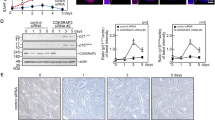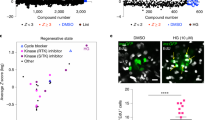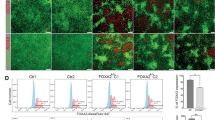Abstract
Cyclin-dependent kinase 4 (Cdk4) and Cdk6, and later Cdk2, in association with their specific cyclin partners, regulate the G1 to S phase cell cycle transition of mammalian cells by phosphorylation of retinoblastoma (Rb) family proteins. Phosphorylation of Rb results in the release of S-phase specific transcription factors; cell cycle-promoting gene expression, and advancement of the cell cycle. Loss of Cdk4 by homologous-targeted disruption leads to a delay in S-phase entry in serum-stimulated mouse embryo fibroblast (MEF) cultures. Homozygous Cdk4-deficient mice display defects in weight gain, fertility and hypoproliferation of specific endocrine cells of the pituitary and pancreas, the latter of which results in a diabetes-like phenotype. In contrast, inheritance of the p16Ink4a-insensitive Cdk4R24C mutation leads to spontaneous transformation of MEF cultures in vitro and, in vivo, hyperproliferative disorders that progress to cancer. In this manuscript, we report characterization of the abnormal pancreatic development, reduced growth and infertility in Cdk4 mutant mice. We observe that, whereas Cdk4 is dispensable for early pancreatic development, normal Cdk4 expression is critical for optimal growth of the organism. Also, we observe that loss of Cdk4 may result in insulin insensitivity, implicating an additional role of Cdk4 in β-cell function, in addition to its role in β-cell proliferation. Further, we demonstrate that loss of Cdk4 leads to an age-dependent defect in spermatogenesis and disruption in the timing of the estrus cycle. Taken together, our results indicate that the overall defects in growth, fertility and pancreatic development in Cdk4-deficient mice may be a combination of cell-type specific defects and altered glucose metabolism, as a result of defects in postnatal pancreatic development.
This is a preview of subscription content, access via your institution
Access options
Subscribe to this journal
Receive 50 print issues and online access
$259.00 per year
only $5.18 per issue
Buy this article
- Purchase on Springer Link
- Instant access to full article PDF
Prices may be subject to local taxes which are calculated during checkout





Similar content being viewed by others
References
Amann RP, Johnson L, Thompson Jr DL and Pickett BW . (1976). Biol. Reprod., 15, 586–592.
Bell GI and Polonsky KS . (2001). Nature, 414, 788–791.
Benton L, Shan LX and Hardy MP . (1995). J. Steroid. Biochem. Mol. Biol., 53, 61–68.
Bouwens L and Klöppel G . (1996). Virchows Arch., 427, 553–560.
Edlund H . (2002). Nat. Rev. Genet., 3, 524–532.
Grana X, Garriga J and Mayol X . (1998). Oncogene, 17, 3365–3383.
Kamb A, Gruis NA, Weaver-Feldhaus J, Liu Q, Harshman K, Tavtigian SV, Stockert E, Day III RS, Johnson BE and Skolnick MH . (1994). Science, 264, 436–440.
Mauvais-Jarvis F, Kulkarni RN and Kahn CR . (2002). Clin. Endocrinol., 57, 1–9.
Moons DS, Jirawatnotai S, Parlow AF, Gibori G, Kineman RD and Kiyokawa H . (2002a). Endocrinology, 143, 3001–3008.
Moons DS, Jirawatnotai S, Tsutsui T, Franks R, Parlow AF, Hales DB, Gibori G, Fazleabas AT and Kiyokawa H . (2002b). Endocrinology, 143, 647–654.
Murray FT, Cameron DF, Orth JM and Katovich MJ . (1985). Horm. Metab. Res., 17, 495–501.
Murray FT, Orth J, Gunsalas G, Weisz J, Li JB, Jefferson LS, Musto NA and Bardin CW . (1981). Int. J. Androl., 4, 265–280.
Nobori T, Miura K, Wu DJ, Lois A, Takabayashi K and Carson DA . (1994). Nature, 368, 753–756.
Ortega S, Malumbres M and Barbacid M . (2002). Biochim. Biophys. Acta, 1602, 73–87.
Rane SG, Cosenza SC, Mettus RV and Reddy EP . (2002). Mol. Cell. Biol., 22, 644–656.
Rane SG, Dubus P, Mettus RV, Galbreath EJ, Boden G, Reddy EP and Barbacid M . (1999). Nat. Genet., 22, 44–52.
Rane SG and Reddy EP . (2000). Front Biosci., 5, 1–19.
Sherr CJ . (2000). Cancer Res., 60, 3689–3695.
Sotillo R, Dubus P, Martin J, de la Cueva E, Ortega S, Malumbres M and Barbacid M . (2001). EMBO J., 20, 6637–6647.
Tsutsui T, Hesabi B, Moons DS, Pandolfi PP, Hansel KS, Koff A and Kiowakowa H . (1999). Mol. Cell. Biol., 19, 7011–7019.
Toscani A, Mettus RV, Coupland H, Litvin J, Orth J, Hatton KS and Reddy EP . (1997). Nature, 386, 713–717.
Trimarchi JM and Lees JA . (2002). Nat. Rev. Mol. Cell. Biol., 3, 11–20.
Wolfel TA, Hauer M, Schneider J, Serrano M, Wolfel C, Klehmann-Hieb E, De Plaen E, Hankeln T, Meyer zum Buschenfelde KH and Beach D . (1995). Science, 269, 1281–1284.
Zuo L, Weger J, Yang Q, Goldstein AM, Tucker MA, Walker GJ, Hayward N and Dracopoli NC . (1996). Nat. Genet., 12, 97–99.
Acknowledgements
We thank Dr E Premkumar Reddy for continued support and encouragement. Sushil G Rane was supported by a National Cancer Institute (NCI) Scholars Grant K22CA90790-01.
Author information
Authors and Affiliations
Corresponding author
Rights and permissions
About this article
Cite this article
Mettus, R., Rane, S. Characterization of the abnormal pancreatic development, reduced growth and infertility in Cdk4 mutant mice. Oncogene 22, 8413–8421 (2003). https://doi.org/10.1038/sj.onc.1206888
Received:
Revised:
Accepted:
Published:
Issue Date:
DOI: https://doi.org/10.1038/sj.onc.1206888
Keywords
This article is cited by
-
Hexachlorobenzene, a pollutant in hypothyroidism and reproductive aberrations: a perceptive transgenerational study
Environmental Science and Pollution Research (2021)
-
CDC123/CAMK1D gene rs12779790 polymorphism and rs10811661 polymorphism upstream of the CDKN2A/2B gene in women with gestational diabetes
Journal of Perinatology (2017)
-
The cell cycle as a brake for β-cell regeneration from embryonic stem cells
Stem Cell Research & Therapy (2016)
-
Islet biology, the CDKN2A/B locus and type 2 diabetes risk
Diabetologia (2016)
-
MEN1 tumorigenesis in the pituitary and pancreatic islet requires Cdk4 but not Cdk2
Oncogene (2015)



